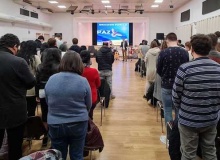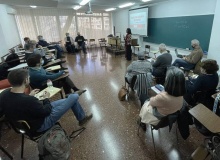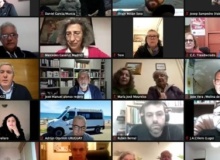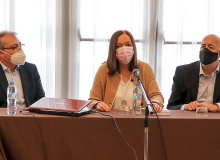


The Evangelical Council of Madrid and the regional government signed a collaboration protocol which includes Reformation Day as a relevant event in the region.

“The award recognises the impressive work carried out for over thirty years by around forty collaborators. We thank God for all”, said the Bible Society in a statement.

An exhibition in the Spanish city of Ourense shows the difficulties evangelicals had in the 19th and 20th centuries to share their ideas in freedom.

The missionary had gone to the city to help with the evacuation. He worked for a Christian organisation that is helping Ukrainian orphans.

A report finds that the pandemic has accelerated the loss of religiosity in Spanish society, especially among those under the age of 34.

Since 1922 it aims “to help young believers, eager to give themselves entirely to the service of Christ”. 45 pupils are currently studying at the Seminary with 21 teachers.

In a sentence, the highest court in Spain clearly opposes surrogacy because “it violates fundamental rights recognised in the Constitution and international agreements on human rights”.
.jpg)
Thousands have already been hosted by families in countries like Switzerland, Germany, Spain and the UK. Websites connect refugees and potential hosts.

Hélder Favarin, evangelist and pastor in Spain, addresses some of the challenges of preaching to both Christians and non-Christians.

The Global Mercy will spend several weeks on the Spanish island, before leaving for its first humanitarian mission in Africa.

The pastor of a church on the Romanian border with Ukraine explains how, along with a church in Spain, they help refugees to meet their basic needs.
.png)
“We can reach so many people who need to hear the gospel. It's very rewarding to be able to come to this place”, says one of the volunteers.

Vitaly Vlasenko, a pastor in Moscow, in an open letter: “As a citizen, I apologize to all those who have suffered, lost loved ones and relatives, or lost their place of residence”.

The EU said that migration along the West African Atlantic route to the Canary Island is increasing, with “at least 73 boat accidents killing 1,109 migrants” in 2021.

Over 2.3 million have left Ukraine since the start of the Russian invasion two weeks ago. Evangelical congregations on the other side of the continent connect to welcome families fleeing the war.

The Missions Working Group of the Spanish Evangelical Alliance launches an initiative for the collaboration of churches and organisations that send missionaries from Spain.

The largest evangelical denomination in Spain held its annual congress in a hybrid format under the theme "Do it again!"

Prostitutes are moved from the streets to private houses, making it difficult to detect and help them. The evangelical NGO Fiet Gratia works to offer them a way out.

Two months after the eruption stopped, evangelicals work to cover the basic needs of those affected and to support local businesses. Authorities have publicly recognised them.

A report compares suicide rates in countries where euthanasia is legal, with those where it is not. “Legalizing euthanasia will not help prevent suicide”, it says.

Päivi Räsänen was the main speaker at the 2022 General Assembly of the Spanish Evangelical Alliance: “Everyone should be free to express their deeply held beliefs about important issues without fear of censorship or criminal sanction”.

Streets and squares in the city will be named after women such as Isabel de Baena and Francisca de Chaves, tortured by the Spanish Inquisition.

Only three of the 24 crew members have been rescued alive so far. One of them is a Ghanaian sailor and a member of the Evangelical Church of Marin.

Czech and Spanish evangelicals went online to begin the year in prayer and in practical fellowship with their brothers and sisters.

The speakers at the evangelical gathering stressed that criticism and offense should not be equated to hate speech, and that freedom of expression should prevail in case of doubt.

Las opiniones vertidas por nuestros colaboradores se realizan a nivel personal, pudiendo coincidir o no con la postura de la dirección de Protestante Digital.